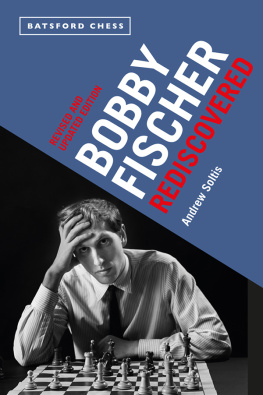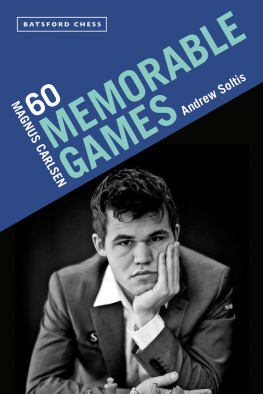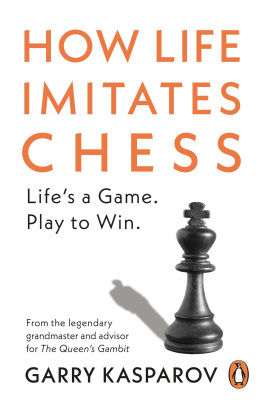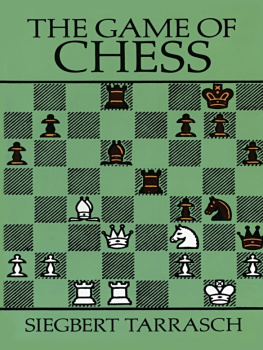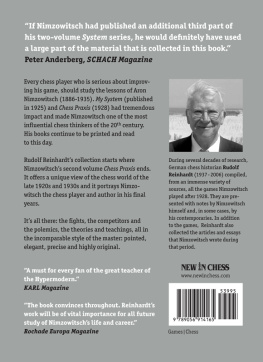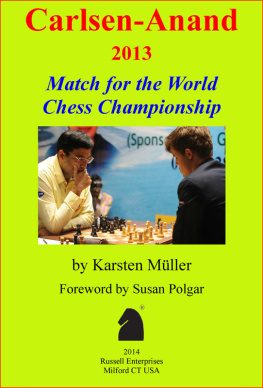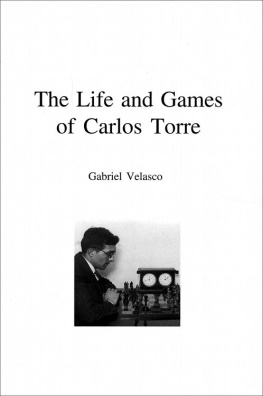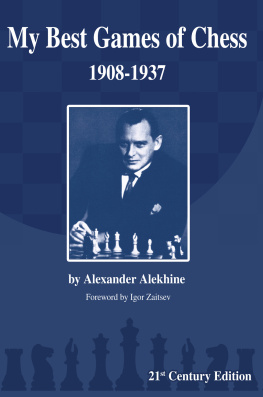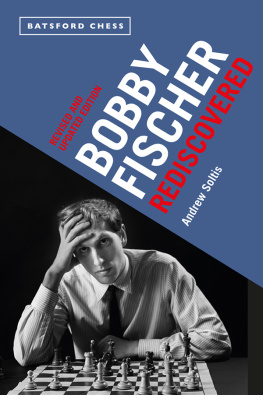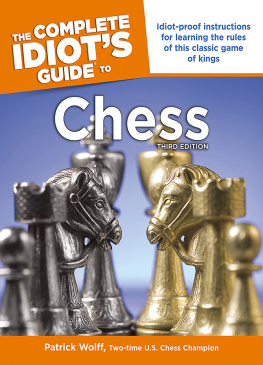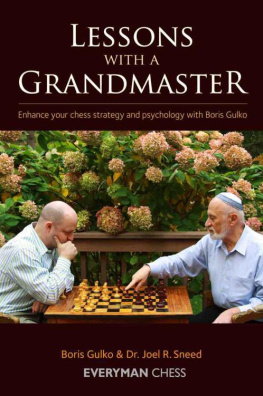How Magnus Carlsen
Became the Youngest Chess
Grandmaster in the World
Compelling tale,exciting chess.
Jan Timman, former World Chess Championship finalist
From beginners errors to better and better achieve ments, the reader learns how a real chess prodigy develops, temporary setbacks and disappointments included (..) One has to give great praise to the author for his honesty and empathy and for the unselfish way he tells the story.
Heinz Brunthaler, Rochade Europa Magazine
A splendid book, accessible for a big audience.
Herman Grooten, author of Chess Strategy for Club Players
No doubt about it, the kid is good (..) Agdestein does a good job indicating how various moves and ideas show Carlsens growth as a player.
Taylor Kingston, ChessCafe
A wonderful book for children, but also for adults.
Johan Hut, Gooi en Eemlander
It is quite special to see how this boy, when he is 10 years old, starts to advance with giant strides through the chess world. That is why playing through these games is such a valuable experience.
Minze bij de Weg, Schaak Magazine
I finished it in one go.
Jules Welling, Schaaknieuws
Agdesteins insider story is packed with detailed information about what makes the boy so successful.
Harald Fietz, Schach Magazine
What Agdestein has written is clearly a labour of love.
Max Pam, Het Parool
How Magnus Carlsen
Became the Youngest Chess
Grandmaster in the World
The Story and the Games

by his trainer
Simen Agdestein
2013 New In Chess
Originally published as Wonderboy
2013 New In Chess
Originally published as Wonderboy ( 2004 New In Chess)
Published by New In Chess, Alkmaar, The Netherlands
www.newinchess.com
e-mail:
All rights reserved. No part of this book may be reproduced, stored in a retrieval system or transmitted in any form or by any means, electronic, mechanical, photocopying, recording or otherwise, without the prior written permission from the publisher.
Translated from the Norwegian by Jonathan Tisdall
Cover design: Volken Beck
Production: Joop de Groot, Anton Schermer
Editors: Dirk Jan ten Geuzendam, Peter Boel
ISBN: 978-90-5691-442-4
Contents
Preface to the new edition
I assured myself after writing the first edition of this book that there would be no follow-up. No Wonder boy II or III from me.
Magnus had become a grandmaster at an extremely early age and I had been given the chance to follow this extraordinary talent from when he started getting interested in chess at the age of 9 to when he was the youngest grandmaster in the world four years later. It was an adventure and certainly a story to tell!
However, such enormous success also brings a lot of pressure. Magnus has been a prey for journalists since he was 13 and I didnt want to add to this by pretending I was his personal biographer. I was worried already then about how all this attention would affect him. Magnus certainly was very mature for his age and chess-wise he was of professor level even before he was a teenager. But still, he was just a child.
In hindsight we can breathe a sigh of relief that things turned out as well as they did. Magnus became the number one in the world when he was 19 and is now way ahead of the next players in rating. Hes certainly been recognized as one of Norways greatest sportsmen and worldwide he is perhaps more famous than any Norwegian ever.
Magnus is a tremendous chess talent, but his success hasnt come by itself. There has been quite a bit of wisdom accompanying him on his way. His family deserves all possible praise for giving him such a good start. A great job has been done, but the main thing is perhaps that Magnus has kept his enthusiasm for the game throughout; so much so that hes spent on average more than five hours on chess per day in a period of more than ten years.
In Norway we say that it takes 10,000 hours to become world-class in something, and that makes sense for Magnus. Hes been playing almost 200 tournament games per year, and with preparation before and analysis after the games thats a hell of a job.
It may seem that Magnus has played his way to the top, but that is only partly true. He has trained and worked too. Its just that hes been doing it his own way. The family got plenty of advice about how important it was to do this and do that when he was 14-15 years old. Even Garry Kasparov added to the choir by claiming that these years would be crucial.
But such words did not bite Magnus. Magnus is unique, but still hes very Norwegian in his approach. That may sometimes be understood in negative terms, but Im not so sure about that. I think almost any foreigner coming to Norway would be struck by the lack of discipline in Norwegian culture, but we do actually have some fantastic athletes around here. With a talent like Magnus I think one should be very careful not to try to force anything upon him. The job of those around him should simply be to tend to the garden and let the plant grow freely. However, I sometimes wonder how strong Magnus could have been if hed had the discipline of Garry Kasparov in addition to all the other assets he has. Magnus has his weaknesses and he knows this very well himself. Even now, when hes number one in the world, I sometimes say hes got good potential.
Im very glad when in interviews I hear Magnus say the same thing we said when he was 10 years old, namely that the goal is to master the game. And of course hes smart enough to understand that there still is a lot to learn. I think this mental concept is very clever, as its very easy to be misled by external goals like achieving a title or a rating or whatever. The focus should be on the process and on nothing else.
Magnus has been very good at such mental adjustments, but in the Candidates tournament in London even he was in trouble when so much was at stake. In the last three rounds he was totally out of control and actually he was extremely lucky to win and qualify for the World Championship match with reigning champion Vishy Anand.
There are actually a few things that we talked about when Magnus was just a little boy that we can still see in the way Magnus plays today. Kasparov was really dominant at that time, but one day he would quit, and then how would the next number one play? Anatoly Karpov had his style, and it worked in his day Kasparov had a completely different style. Kasparov was the first and the best in exploiting the power of the computer, but the others followed in his footsteps and soon their preparation became just as good as Kasparovs.
The way to get away from all this would simply be to vary your openings all the time. Kasparovs opening repertoire was fairly limited (although I believe he knew absolutely everything!). The next number one had to be totally unpredictable. And that is exactly what Magnus is now. He can play anything and you never know what to expect from him. While Kasparov is (or was) concerned about eternal values, Magnus is only interested in what works to beat that particular opponent on that particular day.
I have the impression that Kasparov was close to anatystng many of his lines until the very end, but this approach seems more like science. Magnus is a sportsman. By changing your openings all the time you force your opponent into unknown territory and you also keep the game much more interesting for yourself. How exciting it is to discover new ideas over the board!
It would have been interesting to see Kasparovs depth added to Magnus pragmatism, but the general answer to all this well-meaning advice is that you cant argue with success. Magnus has been extremely successful with his over-the-board fighting approach. Now he is the number one, and the one whose play everyone tries to imitate. In that respect, hes very powerful.
Next page

